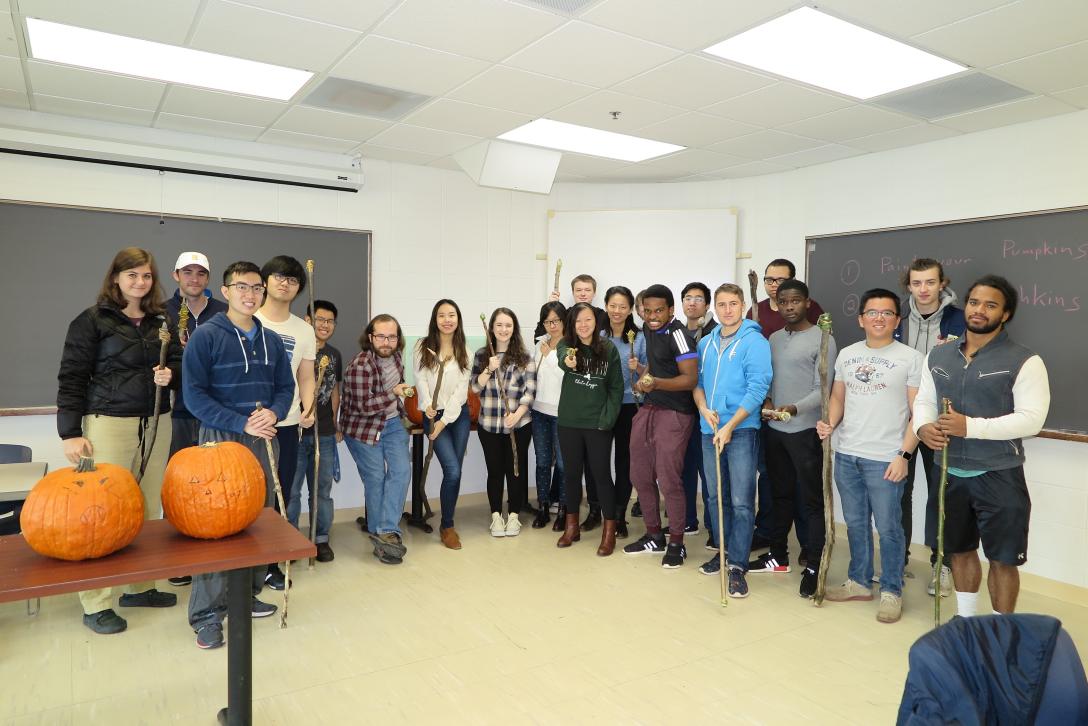 CSC 175 Creative Computing Seminar: Assignments
CSC 175 Creative Computing Seminar: Assignments
-
The assignments will be posted here after the day's class,
along with the due date.
Assignments are due at the beginning of class on the due date.
In general, no credit will be allowed for late assignments.
Turn what you have in in for partial credit.
-
For any written assignment, I expect a well organized
report-style writeup that describes in detail what you did, why you did it,
and what the results were. This includes negative results.
Scratch work and computer code, if requested should be appended to the main
writeup with appropriate pointers.
-
Attribute ANY work that is not your own, including software off the
web, text cribbed from other sources, etc.
You are encouraged to look for resources, but not to the extent that
it negates the point of the assignment.
This is sometimes a fine line, especially in programming assignments.
I will try to be specific as to what I expect you to write
as a minimum. If in doubt, ask.
In any case, use of UN-attributed material is plagiarism, and a violation
of the University's academic honesty policy.
Plagiarism is taken VERY seriously in this department. DON'T DO IT.
If in doubt, reference.
-
Specifically, text taken from web pages, even a single sentence,
is plagiarism. Text paraphrased from web pages is plagiarism.
Sentences from web pages cut up into phrases and re-arranged are
plagiarism.
If you want to avoid possible problems, my suggestion is
never write while looking at text. Generate everything from your
own understanding of the subject.
-
Use of unattributed text in any written assignment will result in
zero credit for that assignment.
Text that comes from an outside source should appear in quotes.
Too much use of quoted material will tend to reduce your credit
for an assignment, as the point of written assignments is to
convey your understanding of a subject.
-
In general, you should consider written assignments for this course
to be public documents - just as published research papers are public
documents. As such I may place them in a forum where they may be
scrutinized by your colleagues for accuracy, clarity, and for
unattributed material.
-
You are encouraged to discuss general techniques and specific approaches
to general problems with your fellow students, or anyone else.
Unless specifically directed in an assignment, however, you are not to
share code you have written, or your written solutions to specific
problems.
Wednesday, August 31, 2016
- Class activity: Introductory material:
- Mystery object.
- Class activity: Counting.
- Assignment:
Finish counting your beans. Bring results to class Friday.
After counting, if you like,
you may cook your beans into a delicious
soup.
Due: Friday, September 2, 2016.
Friday, September 2, 2016
- Class activity: Counting cont.
Discussion of group-splitting error accumulation.
Discussion of parallel tree addition.
- Class activity: Final exam preview.
- Assignment:
Bring as close as you can to exactly 1,000,000 separated material objects that
are individually visible to the naked eye, and be prepared to prove to the
class that you do have (very close to) 1,000,000 items.
Note, this assignment is not about cleverness in interpretation of the
question, but about visualizing the size of a million.
So kilobytes, pixels, symbols on a screen etc. don't count
(they are not material objects).
Printed characters don't count unless physically cut apart.
Bragging rights for novelty (i.e. objects of a type no one else brings in)
Due: Wednesday, September 7, 2016.
Wednesday, September 7, 2016
- Class activity: Presentation of Millions.
(discussion of biggest visible numbers, etc.)
- Assignment:
30 Women a day in the US are diagnosed with cervical cancer.
The UR-developed vaccine Gardasil will (probably) prevent most cases
if given adolescence. It is being marketed at between $300-$500 for the
course of three injections.
The cost of treating a diagnosis of cervical cancer averages between
$20,000 (early) and $40,000 (late).
Evaluate roughly whether it is to the direct financial advantage of
an insurance company to pay for the vaccine for all young women.
Consider initially only the steady state, ignoring the fact that reduced
payouts for cancer treatment will not show up for several years.
Bring your answer the question above to class and be prepared
to defend it.
Due: Friday, September 9, 2016.
Friday, September 9, 2016
- Class activity: Quiz 1. (mainly mathematical constants)
- Class activity: Discussion of Gardasil Insurance question.
- Class activity: Initial questions for discussion:
- 1. What is your share of the next trillion dollars in
national debt? How many trillion is the current debt?
- 2. The BP oil spill of 2010 dumped roughly 200 million gallons of
petroleum into the gulf of Mexico.
A BP spokesman commented that this was a very
small fraction of the amount of water in the Gulf, and therefore the
environmental impact should be minimal. Discuss the veracity of this
statement.
- 3. Murders in Chicago hit 500 for 2016 over the
Labor day weekend, compared to about 340 at this date in 2015,
which was about average over the last decade.
Should someone or something be criticized for making the city less safe?
- 4. Future News Flash!! In the 2017 democratic primary election for
Rochester Mayor,
Lovely Warren and Alex White are separated by 50 votes
with a pool of 1000 disallowed ballots in dispute.
Estimate the probability that counting these would shift the outcome
- Assignment:
Estimate the total amount (mass) of matter that is part of an average human
body during their lifetime. Don't count air briefly contained in the lungs,
but not incorporated into the body.
How many atoms in a glass of California Chardonnay were once part of
the philosopher Democritus?
Hand in a writeup as usual. Pay special attention to the assumptions
you made in order to arrive at a reasonable answer.
Due: Wednesday, September 14, 2016.
Wednesday, September 14, 2016
- Class activity: Discussion of atoms of Democritus.
- Assignment: Study and know the names and prefixes for large and small
numbers (in the "Numbers Everyone Should Know" list).
- Assignment:
Estimate the total amount of gold dissolved in the world's oceans.
Compare with the total amount of gold that has been mined in human history.
What is the current market value of the gold dissolved in one cubic
kilometer of seawater?
What is the current market value of the salt dissolved in one cubic
kilometer of seawater?
Come to class prepared to present your work.
Due: Friday, September 16, 2016
Friday, September 16, 2016
- Class activity: Quiz 2. (mainly numerical prefixes)
- Class activity: Discussion of sea gold.
- Assignment: For next week, study the unit conversions section of
"Numbers Everyone Should Know".
- Assignment: Estimate the total distance traveled by a red blood
cell in the human body, relative to its local environment
(blood vessel walls), over its lifetime.
Due: Wednesday, September 21, 2016
Wednesday, September 21, 2016
Friday, September 23, 2016
Wednesday, September 28, 2016
- Class activity: Discussion of construction cost estimates.
- Assignment: For Friday, find some common milkweed growing outdoors.
Bring in a pod, or a selfie with milkweed as proof you found it.
- Assignment:
Sodium in prepared calorie-source foods
Due: Wednesday, Oct. 5, 2016
Friday, September 30, 2016
- Class activity: Discussion of construction cost estimates, cont.
- Assignment: Keep working on
Sodium in prepared calorie-source foods
Due: Wednesday, Oct. 5, 2016
- Assignment: For next week, learn/memorize the "earth" section of
"Numbers everyone should know".
Wednesday, October 5, 2016
- Class activity: Presentation of Sodium research.
- Assignment:
History of Units
Due: Friday, October 7, 2016
Friday, October 7, 2016
- Class activity: Presentations on units.
- Class activity: Discussion of distributions in unbounded natural sets.
- Assignment:
The distribution of size
Due: Friday, October 14, 2016
- Assignment: For next week, learn/memorize the "astronomy" section of
"Numbers everyone should know".
Wednesday, October 12, 2016
- Class activity: Presentations on units cont..
Friday, October 14, 2016
- Class activity: Discussion of sizes
- Assignment:
If methods of oxygen replacement (e.g. photosynthesis) were eliminated,
estimate the time it would take for all human activity (respiration, animal
husbandry, industry etc.) to render the atmosphere unbreathable due to
oxygen depletion.
If CO2 sinks were also eliminated, how long would it take
to render the atmosphere unbreathable due to CO2 accumulation?
How long would it take the world's stored food supply to
to run out if photosynthesis were shut down? (Assume no drastic
action such as premptively killing 99.9% of the population before
they ate much.)
Due: Wednesday, October 19, 2016
- Assignment: Learn/memorize the "air" section of
"Numbers everyone should know"
Wednesday, October 19, 2016
- Class activity: Discussion of atmospheric breathability.
- Assignment: Bring in a stone-tipped spear you made using nothing
but naturally occuring materials and objects you find yourself
in the immediate Rochester area.
No tools except what you make from natural objects.
(e.g. hammerstones and pressure flakers for shaping stone,
a hand-axe or pebble tool for shaping wood...)
Old beer bottles don't count as natural.
Roadkill on the other hand... well, we killed all the wolves, so
maybe we should count cars as predator equivalents...
Domestic animals OK if you have direct access to one, (no buying a
chicken at the store) but you have to process
anything you get from it yourself.
Note that if you bang rocks together, you should wear glasses.
And maybe protect the hand holding any rock you are breaking.
And banging rocks is not the only way to shape stone.
Also, if you don't know what poison ivy is, don't go tearing
random vines off of trees - a lot of the vines attached to tree
trunks in this area are, in fact, poison ivy.
Vines are not the only way to attach a spear point to a shaft - or
even a particularly good one.
There are some pretty good collections of small cobbles in some of the
landscaped areas around campus. And there is a lot of natural growth
in Genessee Valley Park. Don't noticably damage any University
planting or facility (e.g. don't pull ivy from the ivy-covered
walls, or break building floor tiles by banging rocks on them).
Basically, try to exercise good sense
(which is one thing this class is about...)
Due: Wednesday, October 26, 2016.
Then on Friday, Oct 28, we will test the artifacts on pumpkins.
Friday, October 21, 2016
- Class activity: The game of
PLAUSIBILITY.
- Assignment: Work on your lithic artifact for next Wednesday.
Wednesday, October 26, 2016
- Class activity: Initial display of paleolithic technology.
- Class activity: Stone pit field trip.
- Assignment: Improve your lithic artifact for Halloween
pumpkin piercing contest next Friday.
Friday, October 28, 2016. Pre-Halloween
- Class activity: Stone-age pumpkin-piercing contest.
- Assignment: Write-up your paleolithic experience.
Due: Wenesday, Nov 2, 2016
Primitive Pumpkin Piercing Pictures




Wednesday, November 2, 2016
- Class activity: Discussion of numeric representation schemes.
- Class activity/assignment: Bug problem exposition.
- 1. Estimate the total number of ants in the world.
Carefully justify your approach (just don't quote the number you find
on the internet).
Estimate their total mass. Compare to the total human mass. Who wins?
Could ants, working together, carry off an intact human? (ala Indiana Jones
and the Last Crusade, and innumerable similar scenes from B movies
over the last century)
- 2. How many trips by individual honeybees are required to
produce a kilogram of honey?
How many flowers are visited?
For typical distances between hive and flower patches (justify), how many
kilometers are collectively flown?
Again, don't just quote numbers off the internet; discuss how
the numbers are obtained from the basic measurable quantities.
- 3. How many mosquito bites would it take to remove a dangerous
amount of blood from a person (i.e. "sucked dry by mosquitoes").
How long would it take under optimal mosquito exposure?
How much blood is sucked in a year by the world's mosquitoes from all
the animals that they bite?
- Assignment: Learn/memorize the "water" section of
"Numbers everyone should know". (Also review "air", most of which
you should have picked up during the breathablity
assignment.)
Friday, November 4, 2016
- Class activity: Discussion of bug problems
- Assignment: One of four
energy problems.
Write up and be prepared to discuss the one you are assigned.
Due: Wednesday Nov. 9, 2016.
- Assignment: Learn/memorize the energy ("fire") section of
"Numbers everyone should know"
Wednesday, November 9, 2016
- Class activity: Discussion of fossil fuel resources and usage.
- Class activity: Discussion of uranium resources and usage.
Friday, November 11, 2016
- Class activity: Discussion of biomass energy.
- Class activity: Discussion of solar energy.
- Assignment:
Measures of heaven and earth.
Write up and be prepared to discuss the measurement you are assigned.
Due: Wednesday, November 16, 2016.
- Assignment: Review the "Earth" and "Astromony" sections
of "Numbers everyone shold know" (you already learned them right?).
Wednesday, November 16, 2016
- Class activity: Presentation of "Measures" research.
Friday, November 18, 2016
- Class activity:
Presentation of "Measures" research cont.
- Assignment: Figure out a practical, low-effort method for selecting a
random recipe from a paper cookbook (say "The Joy of Cooking"),
that is as close to unbiased as possible.
No electronic computers allowed. Write it up.
Note that many cookbooks have page sequences without recipes, and
otherwise have a variable number of recipes per page.
Due: After Thanksgiving
Friday, November 21, 2014
- Class activity:
Presentation of "measures" research cont.
Wednesday-Friday November 25-27, 2015
Wednesday, November 30, 2016
- Class activity: Presentation and discussion of random recipes
- Assignment: Compute the number of 5-card deals and the probability of
a hand containing (1) The queen of spades and the jack of diamonds,
and (2) Three red and two black cards.
Look up the probabilities of obtaining the standard poker hands in 5-card
deals from a standard deck (i.e. no jokers).
For this assignment, carry out probabilities to at least 4 decimal places
(More than is usual for this course).
Due: Friday, December 2, 2016
Friday, Dec 2, 2016
- Class activity: Elementary counting and probability (for poker).
- Class activity:
More Randomizing, and sorting too.
- Assignment:
Look up and learn about the games of straight, draw, and stud poker.
Thought exercise: RoboWorld
Imagine that the world has reached a state where every
good and service needed for a comfortable material life is provided
by robots and computers with the assistance of a few experts (managers
engineers, etc., say 1% of the population)
Comfortable material existence means decent food, housing, clothing,
other technological artifacts needed for daily living,
transport, information access, health care (robodoc),
education (MOOCs etc.)...
BUT, there are still limits on the total amount of stuff that can
be produced (e.g. there is not enough land on earth for every person
now alive to have a 1 square km. estate).
So the productivity of the world's robots still needs to be divied up
somehow. Call the process the economy.
The world's current economic game is basically needs-based.
Person A can do something person B needs to live comfortably
(make a house, grow food, install a computer, bring bananas from Brazil,
remove a tumor), and stuff is basically allocated by people bargaining
for exchange of essential services they can provide (with the whole
process greased and made incredibly interesting and complicated by
liquid, universal debt, aka money).
But if the people are not needed to provide necessities,
then no one (except maybe the 1% and the robots) has anything to
seriously bargain with, and the system would seem
to lose its driving energy.
Plan to write a page or so (for Friday) speculating about how a
worker-free economy might
operate. What would the rules be? How is the loot divided up and
finite (if large) resources allocated?
It is notoriously difficult (probably impossible) to predict
how a set of rules will play out in society except by trying it, so
consider whether any existing or previously tried systems offer
evidence as to how your ideas might work.
The only criterion is that the economy must be one into which you
would be happy to be dropped (as one of the 99%).
Just remember that the material you have to work with is human beings,
who are limited, fallible, and (at least to start with) often damaged.
Wednesday, Dec 7, 2016
- Class activity: Applied probability: straight, draw, and stud poker.
Friday, Dec 9, 2016
- Class activity: Applied probability ii: Texas hold-em..
- Final Assignment:
Take a look at the ingredient list on the snack (handed out in class).
For your assigned ingredient(s), research why it is in the snack.
Then investigate the source of each ingredient.
First, find the manufacturer nearest to Rochester NY.
Then track the ingredient all the way back to "ground". For example,
wheat flour is made from wheat, which is grown e.g. in Montana.
Salt is mined out of the ground (or extracted from seawater).
Sorbic acid, on the other hand...
For each mined, extracted, or farmed component that goes into your
snack ingredient,
provide a source as close as possible to Rochester NY
(e.g. wheat, Ontario CA; salt, Azco Nobel salt mine in Retsof NY; ...)
Be prepared to present your results (5 minutes),
and hand in the usual writeup.
(Inspired by a book by Steve Ettlinger
http://www.twinkiedeconstructed.com/Twinkiewebsite/Welcome.html)
Due: At final exam meeting. 12:30, Monday December 19, 2016.
 Back to CSC 175 main page
Back to CSC 175 main page



